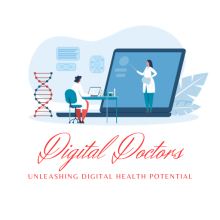Inspirational journeys
Follow the stories of academics and their research expeditions
Must-Have Digital Tools for Virtual Medical Consultations: A Comprehensive Guide for Healthcare Professionals

Introduction
The rise of telemedicine has transformed healthcare, making virtual medical consultations an integral part of patient care worldwide. As healthcare professionals adapt to this digital shift, leveraging the right tools is crucial for ensuring high-quality, secure, and effective consultations. This comprehensive guide explores the must-have digital tools for virtual medical consultations, covering video conferencing platforms, electronic health records (EHR) systems, patient management software, AI-powered diagnostic tools, remote patient monitoring, medical translation tools, cybersecurity essentials, and more.
With digital technology continually evolving, healthcare professionals must stay ahead of the curve to deliver optimal patient care. Whether you're a seasoned telehealth provider or just getting started, these tools can help you enhance efficiency, compliance, and patient satisfaction while also streamlining administrative workflows and improving data security.
Additionally, we explore case studies, best practices, and regulatory considerations to help you make informed choices when selecting tools for your practice. Let’s dive in.
1. Secure Video Conferencing Platforms
The foundation of virtual medical consultations is a reliable and HIPAA-compliant video conferencing platform. The right platform should offer high-quality video, encrypted communication, and seamless integration with EHR systems, as well as features like screen sharing, virtual waiting rooms, and real-time annotation tools to enhance patient interaction.
Recommended Platforms:
- Zoom for Healthcare (https://explore.zoom.us/en/healthcare/) – HIPAA-compliant, integrates with Epic EHR
- Doxy.me (https://doxy.me/) – Free tier available, no downloads required for patients
- VSee (https://vsee.com/) – Customizable and optimized for low-bandwidth areas
- Microsoft Teams for Healthcare (https://www.microsoft.com/en-us/industry/health/microsoft-cloud-healthcare) – Integrates with Microsoft 365 and EHRs
- Amwell (https://business.amwell.com/) – Telemedicine platform with built-in billing features
Key Features to Look For:
- End-to-end encryption and data privacy compliance (HIPAA, GDPR, etc.)
- Multi-device accessibility (desktop, tablet, mobile)
- Automated transcription and language translation support
- Cloud storage options for recorded consultations
Case Study:
Johns Hopkins Medicine successfully implemented Zoom for Healthcare, improving access for patients with mobility restrictions while maintaining security and compliance. By integrating with their existing EHR system, they reduced scheduling conflicts and improved patient engagement.
2. Electronic Health Records (EHR) and Patient Management Systems
Seamless access to patient history and real-time updates improve the accuracy and efficiency of virtual consultations. Advanced EHR systems can also automate prescription refills, schedule follow-ups, and integrate AI-driven analytics for early disease detection.
Recommended EHR Platforms:
- Epic (https://www.epic.com/) – Industry leader, integrates with telehealth solutions
- Cerner (https://www.cerner.com/) – AI-driven insights and analytics
- Kareo (https://www.kareo.com/) – Designed for small and medium-sized practices
- Athenahealth (https://www.athenahealth.com/) – Cloud-based, user-friendly platform
- AdvancedMD (https://www.advancedmd.com/) – Telemedicine-integrated EHR and billing solutions
Key Features to Look For:
- Customizable templates for different medical specialties
- AI-powered predictive analytics for early diagnosis
- Seamless integration with telehealth platforms and pharmacies
- Cloud-based accessibility and real-time collaboration
Example:
A multi-specialty clinic in Canada integrated Epic EHR with Zoom for Healthcare, reducing appointment errors by 30% and streamlining follow-ups. Additionally, predictive analytics in the EHR helped identify high-risk patients earlier, improving preventive care measures.
3. AI-Powered Diagnostic and Symptom-Checking Tools
AI is revolutionizing healthcare by assisting with preliminary diagnoses, saving time, and reducing misdiagnoses. These tools can assess symptoms, suggest possible conditions, and even flag critical cases that require immediate attention.
Recommended AI-Powered Tools:
- Ada Health (https://ada.com/) – AI-powered symptom checker for preliminary patient assessments
- Buoy Health (https://www.buoyhealth.com/) – AI-driven healthcare assistant for triaging patient concerns
- IBM Watson Health (https://www.ibm.com/watson-health) – AI analytics for clinical decision support
- Infermedica (https://infermedica.com/) – AI triage and decision-support tool for clinicians
Real-World Application:
In the UK, general practitioners used Ada Health for pre-screening, reducing unnecessary in-person visits by 40%. By integrating AI-powered triage systems, clinics could prioritize urgent cases more effectively and reduce wait times.
4. Cybersecurity Tools for Telehealth
With the rise in virtual consultations, cybersecurity is paramount. Healthcare professionals must safeguard patient data against cyber threats, phishing attacks, and unauthorized access.
Essential Cybersecurity Tools:
- Norton Healthcare Security – Advanced threat detection for healthcare professionals
- Bitdefender GravityZone – AI-driven protection for medical databases
- Dashlane Business – Secure password manager for telehealth practices
Example:
A major telehealth provider in Europe experienced a ransomware attack that disrupted services for days. After implementing AI-powered cybersecurity solutions, they significantly reduced vulnerability to cyber threats.
Conclusion
Virtual medical consultations are the future of healthcare, and adopting the right digital tools ensures efficiency, security, and high-quality patient care. From video conferencing and EHR systems to AI-powered diagnostics, remote monitoring, and cybersecurity solutions, these tools empower healthcare professionals worldwide.
Are you currently using any of these tools in your practice? Let us know your experience in the comments!
Stay Updated!
For more insights on healthcare innovation, subscribe to our newsletter and follow us on LinkedIn!
Tags:
telemedicine virtual consultations healthcare technology EHR systems AI in healthcare remote patient monitoring telehealth security video conferencing for doctors digital healthcare tools0 Comments
Categories
- Career Development and Opportunities in Digital Health 166
- White Papers 39
- IELTS For Medical Professional 35
- OET Exam Preparation 30
- Entrepreneurship and Innovation 26
- Healthcare Innovation 17





Leave a comment